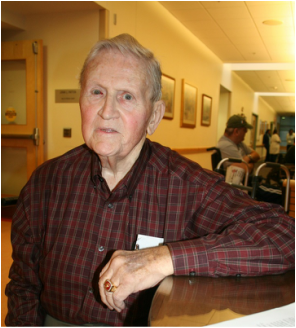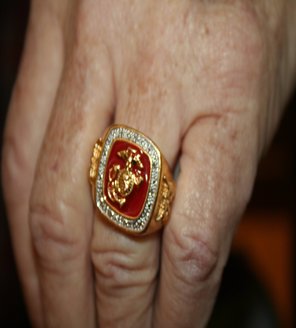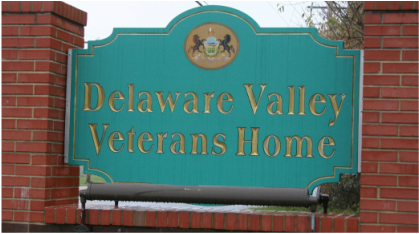All week long One, Unified will be talking to veterans both active and retired, as well as their support systems and those closest to them. It's one small way that we have chosen to honor the brave men and women who have admirably served in the United Stated Armed Forces. Thank you for your service from the bottom of our hearts
WHAT BRANCH OF THE SERVICE DID YOU SERVE IN?
"United States Marine Corps 1951-1967.
I spent 6 years in the regular and the balance (10 years) was in the reserves."
WERE YOU STATIONED LOCALLY?
"In the reserves I was at the Philadelphia Naval Yard and at Willow Grove."
WHAT MADE YOU DECID TO JOIN THE MILITARY?
"Well, the Second World War had ended a few years earlier. I wasn't ready to attend college, so I thought I'd go in there and spend a few years and then go to school. I joined and shortly after, The Korean War broke out. So I ended up being in for the Korean War and I stayed until 1956. Then I met my wife and that was the end of the active duty. Then I stayed in Philadelphia since that was my home. I met her at the USO at 15th and Arch."
DID YOU SPEND TIME SERVING IN KOREA?
"Yes, I was in Korea. I was there for 13 months."
WHAT WAS IT LIKE SERVING DURING WARTIME?
"It was pretty horrible because the people were shot up pretty badly. The country was overrun. Earlier in 1950-51 we invaded and started pushing them up to the north. That's when we had the famous run up to the reservoir and they drew back and ended up at the DMZ (de-militarized zone), which remains standing and they're still fighting about it to this present day. It's actually the 38th parallel and it crosses right through there. We were stationed on the Han River when the war ended."
WHAT IS YOUR MOST VIVID MEMORY OF YOUR TIME IN KOREA?
"I guess the biggest thing that I remember is how horrible it was and how bad off the people were. The homes were pretty well shot up to nothing and they lived in just huts with roofs that were bamboo. It was so cold over there. It's the coldest place I've ever been in my life. It's well known for that. It was like 5-10 below zero. It's warm in the summer but then it gets very very cold."
DO YOU ANY HAVE CHILDREN?
"Yes, my wife and I have two children. A daughter and a son."
DID EITHER OF THEM PURSUE MILITARY CAREERS?
"No."
WOULD YOU HAVE WANTED THEM TO?
"I would've had no objection. But my son decided that he wanted to go to school, which was a smart move, and he did it. So we're just as happy."
DID YOUR FAMILY SUPPORT YOUR DECISION TO GO INTO THE MILITARY?
"Oh yeah, positively. My mother wasn't too happy but she accepted it because my father said "let him get it out of his system." I didn't anticipate a war though."
DID YOU TRAVEL ANYWHERE ELSE WHILE YOU SERVED, BESIDES KOREA?
"I was in China; Guam; San Francisco; Oceanside, California; Quantico, Virginia; North Carolina; Puerto Rico; infamous training on the Mediterranean. We didn't sit around and do nothing. Oceanside was quite a town. It wasn't anything 60 years ago. I can say the same thing about Korea. Friends of mine just came back from visiting Korea and I've talked to some of the local people from Korea, and they were showing me (pictures), and it looked a lot like Levittown or something like that. Single homes. It was devastation when I was there and you just wondered how people existed. People were living under canvas and living in tents and sleeping in anything they could possibly find to cover them. It was horrible. But it was so nice to see what the country has been able to do. And then the interesting thing is, I've seen pictures of North Korea and it's probably about the same as it was 60 years ago. Devastation is still up there. People are still subjected to the great ruler that they have. There's no future. It's sad. I don't know if they'll ever get happy with each other."
WHAT WAS YOUR FAVORITE PLACE OF ALL THE ONES YOU TRAVELED TO?
"Well, probably the best place that I saw was Southern California. I've been back there quite a few times. It drew me to it. As a matter of fact, I would've moved there but unfortunately, my wife had an anchor in Philadelphia, so we stayed in Philadelphia. It's (California) a beautiful part of the country."
DO YOU DO ANYTHING SPECIAL TO COMMEMORATE VETERANS DAY?
"I belong to the VFW and the American Legion and we always do something on Veterans Day. For the last 12 years, I've been here at the veterans home and we have regular ceremonies here on Veterans Day. It just so happens that November 10, the day prior to it, is the anniversary of the U.S. Marine Corps birthday. So we start on the tenth celebrating the marine corp birthday, the 239th, and then we'll have Veterans Day the next day. Works out pretty good."
WHAT MADE YOU DECIDE TO GET INVOLVED HERE AT THE HOME?
"When I retired, and returned to Philadelphia, I thought I'd come over and spend an hour or two, just to get out of the house. And then I became attached to the place and now I usually come over four or five days a week. I enjoy the work. The guys need help. It's an enjoyable time for myself and it keeps me moving."
DO YOU FEEL THAT VETERANS RECEIVE THE HELP OR RESPECT THEY DESERVE?
"I wouldn't say that. I just think we need to keep educating people on the needs of the veterans. A lot of them just ignore it and they don't really know what the needs are. This is one of the things that all of the veterans organizations are trying to do at the present time. Let the people know what the exact needs are of the veteran today. Especially with these young guys coming back from Iraq and Afghanistan. They suffered so much with the IUD's going off over there. PTSD is a real serious problem. Now they know more about it, and we even had our share of it. I wasn't hooked up in the Vietnam war but I know some of the guys that were and it's a pretty serious problem. It's hard to shed some of the memories that you're inflicted with when you're over there. It's difficult."
WHAT CAN PEOPLE DO TO GET INVOLVED AND TO HELP VETERANS?
"I think the thing that they should do, is when there's announcements or different comments made on how to help veterans, maybe once a twice a year, if they don't do it ever, try to do something to help a veteran. There's nothing wrong when you see one of your neighbors who might've been a veteran, mention a thank you for their service. It's a tough thing that they did and we should all be grateful for the guys that put in their time. And especially for the guys that didn't come back, make sure you let their families know that they are missed."
WHAT ADVICE WOULD YOU GIVE SOMEONE THAT IS CONSIDERING JOINING THE SERVICE?
"I would suggest that they get a good education before they go. Because the opportunities of the service are vast. It's not like the old service used to be. It's important that you know your arithmetic, know languages. It's on a higher level. Because of all these weapons and different things, planes, ships are sophisticated. The government right now is very selective on young people joining the service. You have to pass a certain minimum. It's gonna advance their opportunities when they go into the service. I can assure you that I stay close to the service at the present time and one of the first things they do, once you're in about six months, is start to try to interest you in advancing your education internally. You can even get some years of college while your enlisted and get an associates degree and they'll pay for it. So that starts you off pretty good and when you get out, you go for your Bachelors."
"United States Marine Corps 1951-1967.
I spent 6 years in the regular and the balance (10 years) was in the reserves."
WERE YOU STATIONED LOCALLY?
"In the reserves I was at the Philadelphia Naval Yard and at Willow Grove."
WHAT MADE YOU DECID TO JOIN THE MILITARY?
"Well, the Second World War had ended a few years earlier. I wasn't ready to attend college, so I thought I'd go in there and spend a few years and then go to school. I joined and shortly after, The Korean War broke out. So I ended up being in for the Korean War and I stayed until 1956. Then I met my wife and that was the end of the active duty. Then I stayed in Philadelphia since that was my home. I met her at the USO at 15th and Arch."
DID YOU SPEND TIME SERVING IN KOREA?
"Yes, I was in Korea. I was there for 13 months."
WHAT WAS IT LIKE SERVING DURING WARTIME?
"It was pretty horrible because the people were shot up pretty badly. The country was overrun. Earlier in 1950-51 we invaded and started pushing them up to the north. That's when we had the famous run up to the reservoir and they drew back and ended up at the DMZ (de-militarized zone), which remains standing and they're still fighting about it to this present day. It's actually the 38th parallel and it crosses right through there. We were stationed on the Han River when the war ended."
WHAT IS YOUR MOST VIVID MEMORY OF YOUR TIME IN KOREA?
"I guess the biggest thing that I remember is how horrible it was and how bad off the people were. The homes were pretty well shot up to nothing and they lived in just huts with roofs that were bamboo. It was so cold over there. It's the coldest place I've ever been in my life. It's well known for that. It was like 5-10 below zero. It's warm in the summer but then it gets very very cold."
DO YOU ANY HAVE CHILDREN?
"Yes, my wife and I have two children. A daughter and a son."
DID EITHER OF THEM PURSUE MILITARY CAREERS?
"No."
WOULD YOU HAVE WANTED THEM TO?
"I would've had no objection. But my son decided that he wanted to go to school, which was a smart move, and he did it. So we're just as happy."
DID YOUR FAMILY SUPPORT YOUR DECISION TO GO INTO THE MILITARY?
"Oh yeah, positively. My mother wasn't too happy but she accepted it because my father said "let him get it out of his system." I didn't anticipate a war though."
DID YOU TRAVEL ANYWHERE ELSE WHILE YOU SERVED, BESIDES KOREA?
"I was in China; Guam; San Francisco; Oceanside, California; Quantico, Virginia; North Carolina; Puerto Rico; infamous training on the Mediterranean. We didn't sit around and do nothing. Oceanside was quite a town. It wasn't anything 60 years ago. I can say the same thing about Korea. Friends of mine just came back from visiting Korea and I've talked to some of the local people from Korea, and they were showing me (pictures), and it looked a lot like Levittown or something like that. Single homes. It was devastation when I was there and you just wondered how people existed. People were living under canvas and living in tents and sleeping in anything they could possibly find to cover them. It was horrible. But it was so nice to see what the country has been able to do. And then the interesting thing is, I've seen pictures of North Korea and it's probably about the same as it was 60 years ago. Devastation is still up there. People are still subjected to the great ruler that they have. There's no future. It's sad. I don't know if they'll ever get happy with each other."
WHAT WAS YOUR FAVORITE PLACE OF ALL THE ONES YOU TRAVELED TO?
"Well, probably the best place that I saw was Southern California. I've been back there quite a few times. It drew me to it. As a matter of fact, I would've moved there but unfortunately, my wife had an anchor in Philadelphia, so we stayed in Philadelphia. It's (California) a beautiful part of the country."
DO YOU DO ANYTHING SPECIAL TO COMMEMORATE VETERANS DAY?
"I belong to the VFW and the American Legion and we always do something on Veterans Day. For the last 12 years, I've been here at the veterans home and we have regular ceremonies here on Veterans Day. It just so happens that November 10, the day prior to it, is the anniversary of the U.S. Marine Corps birthday. So we start on the tenth celebrating the marine corp birthday, the 239th, and then we'll have Veterans Day the next day. Works out pretty good."
WHAT MADE YOU DECIDE TO GET INVOLVED HERE AT THE HOME?
"When I retired, and returned to Philadelphia, I thought I'd come over and spend an hour or two, just to get out of the house. And then I became attached to the place and now I usually come over four or five days a week. I enjoy the work. The guys need help. It's an enjoyable time for myself and it keeps me moving."
DO YOU FEEL THAT VETERANS RECEIVE THE HELP OR RESPECT THEY DESERVE?
"I wouldn't say that. I just think we need to keep educating people on the needs of the veterans. A lot of them just ignore it and they don't really know what the needs are. This is one of the things that all of the veterans organizations are trying to do at the present time. Let the people know what the exact needs are of the veteran today. Especially with these young guys coming back from Iraq and Afghanistan. They suffered so much with the IUD's going off over there. PTSD is a real serious problem. Now they know more about it, and we even had our share of it. I wasn't hooked up in the Vietnam war but I know some of the guys that were and it's a pretty serious problem. It's hard to shed some of the memories that you're inflicted with when you're over there. It's difficult."
WHAT CAN PEOPLE DO TO GET INVOLVED AND TO HELP VETERANS?
"I think the thing that they should do, is when there's announcements or different comments made on how to help veterans, maybe once a twice a year, if they don't do it ever, try to do something to help a veteran. There's nothing wrong when you see one of your neighbors who might've been a veteran, mention a thank you for their service. It's a tough thing that they did and we should all be grateful for the guys that put in their time. And especially for the guys that didn't come back, make sure you let their families know that they are missed."
WHAT ADVICE WOULD YOU GIVE SOMEONE THAT IS CONSIDERING JOINING THE SERVICE?
"I would suggest that they get a good education before they go. Because the opportunities of the service are vast. It's not like the old service used to be. It's important that you know your arithmetic, know languages. It's on a higher level. Because of all these weapons and different things, planes, ships are sophisticated. The government right now is very selective on young people joining the service. You have to pass a certain minimum. It's gonna advance their opportunities when they go into the service. I can assure you that I stay close to the service at the present time and one of the first things they do, once you're in about six months, is start to try to interest you in advancing your education internally. You can even get some years of college while your enlisted and get an associates degree and they'll pay for it. So that starts you off pretty good and when you get out, you go for your Bachelors."
**If anyone would like to make donations of clothing, toiletries, iPods, or to volunteer or get a list of other needed items please contact Jack O'Donnell at Deleware Valley Veterans Home ~2701 Southampton Rd~ Philadelphia, PA.**



